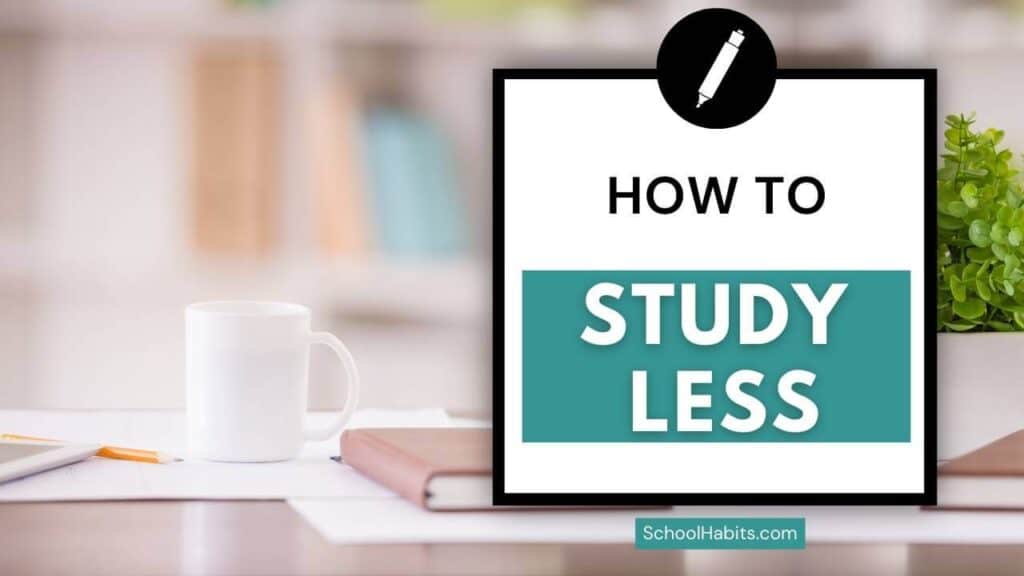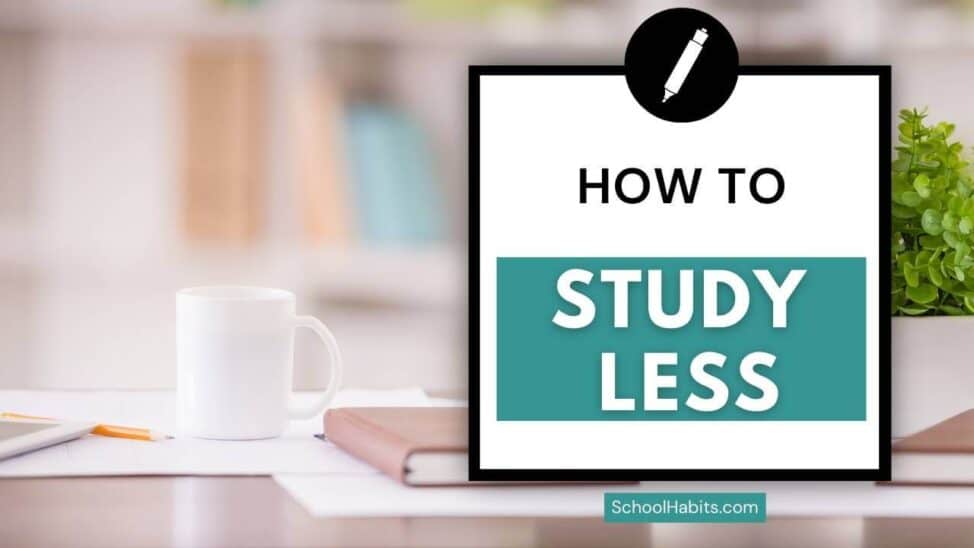By Katie Azevedo, M.Ed.
Everyone wants to study less – including you. That’s the reason you’re reading this in the first place, yes? The good news is that it’s totally possible. In this post, I teach you how to study less by implementing a few simple strategies into your daily school habits.
Curious? Read on.
The myth about studying less
Studying is not a one-time occurrence. You don’t study once for something and call it a day, unless you’re already very familiar with the content and are simply reviewing it right before a test. But then again, that’s reviewing, not studying.
Studying material is the (learning) process by which we essentially put information into our brains well enough that we can recall and apply the information when we need it across various contexts. If you can do this, you have learned the material.
However, this learning process takes time. We can’t rush it. We can’t make our brains work faster the night before a test simply because we procrastinated on our study efforts.
I know you want that to be true, but it’s not.
But just because the learning process takes time, doesn’t mean you have to study a lot. You can, in fact, study less. In the following section, I show you how.
How to study less – 3 strategies
The key to studying less is to learn the material along the way. Read that again.
So many students wait until the day before a test to start studying, but that’s how you end up in a pickle. The key is to slowly work with the material as your teacher teaches it. As you read it. As you write about it. Continuously. Every day. (If for some reason you do end up in a pickle and you only have 1-2 days to study, use these strategies.)
The following 3 strategies will help you actually learn your content gradually so that you don’t have to have an anxiety-filled all-night study session that won’t work anyway.
1. Make a cheat sheet.
Cheat sheets the way I’m talking about here are not cheating. Cheating is messed up and you will never do that.
I have a complete video tutorial about how to make a cheat sheet, and that is truly your best resource to understand this strategy.
But, to provide a little background, here’s how cheat sheets work:
- A cheat sheet is a single-page reference sheet that you make yourself, throughout the course of a unit. (On this page, I show you an example of a cheat sheet.)
- As you learn new content during a unit, add important information to your cheat sheet. Do this by hand, if possible.
- Reference your cheat sheet when you’re doing your assignments, as needed.
- Modify and re-write your cheatsheet as you better determine what information is important or not important.
Making a cheat sheet is a great way to study less for assessments because every time you add to, modify or re-do your cheat sheet, you’re learning the information. The more you learn content along the way, the less you’ll have to study it at the end.
2. Rewrite your notes
If you’re not in the habit of taking notes in the first place, you need to start there. If you’re not taking notes during class or from your textbooks/readings, then of course you’re feeling like you have to study a ton. Because you do. Because you’re basically starting the learning process from scratch. Here’s how to take notes in a lecture class.
The next best (but not the best) situation is if you’ve already established a solid habit of taking notes. This is awesome, and you’re halfway there. Here are 4 ways to take notes that make them easier to study from.
However, the ultimate key to studying less is to work with your notes after you take them. In other words, don’t just take your notes and walk away. What should you do instead? Here are some ideas:
- Take your notes (either during lecture class or from your readings).
- Later that day, go back into your notes and fill in the gaps. The gaps are any areas of confusion or any areas where you’re missing information. When you fill in the gaps, your goal is to make sure that you have total clarity about everything you wrote down.
- Periodically, over the next few days or weeks, go back into your notes and redo/re-write sections that need clarification (now that some of the information has faded from your working memory). At this point, you could even reformat your notes into a format that’s better to study from (2-column notes, for example).
3. Do your assignments to learn, not just to get credit
This one is going to get me some eyerolls. Bring it on, my friend. Roll your eyes all you want, but this is as real as it gets.
Of course, I know that there are a million and one ways to get your assignments “done” just so you get the credit for them. Obviouslyyyy. But this approach is literally a direct path to NOT learning the material. And what happens when you don’t learn the material? You have to study so much more. SO much more.
If you want to study less, then do your work like you mean it. Do the “dumb and annoying” assignments for real, for the sole purpose of learning what you’re being taught. If you do that, you’ll hardly have to study it when the test comes.
I can’t tell you how many times I’ve worked with students who freak out about upcoming tests, but who also don’t complete their homework assignments or complete them in a sketchy way just to get the credit. It boggles my brain. On the other hand, the students who complete their assignments (even when the work is “dumb and annoying” because that’s what we do) almost always feel better prepared for and do better on tests. It’s simple cause and effect, people.
How to study less even when you have multiple tests
It’s still possible to study less even when you have multiple tests on the same day or in the same week. The strategy is the same: Just make sure that you’re truly learning the content throughout the unit, and don’t wait until the last minute to study. Also, be sure you’re planning out your study sessions using spaced repetition. To see how spaced repetition works when studying for multiple tests at once, read this.


